The Sun and the Moon, by Patricia Ryan
>> Thursday, March 08, 2007
Patricia Ryan has written category romance, medieval romance and even historical mysteries, as PB Ryan. I remember reading and liking well enough one of her series titles. The one medieval of hers that I tried, however, I didn't finish. I don't particularly remember Heaven's Fire as a bad book, really. I think I just wasn't in the mood for it at the time, and I never did pick it up again.
In my ongoing attempt to bring my TBR pile under control, I decided to give Ryan's medievals another chance and read The Sun and the Moon.
I liked this one. The plot is pretty interesting, and the romance is nice, too. A B.The Sun:
King Henry's most valued spy, Hugh of Wexford, likes his wine, his women...and above all, his freedon. Scarred by a brutal upbringing, Hugh vowed long ago to make his own way in the world, unhindered by ties of any kind--especially those of love.
The Moon:
Oxford scholar Phillipa de Paris is learned, enlightened...and painfully innocent in the ways of the world--especially the lascivious intrigue that she encounters when Hugh recruits her for a critical espionage mission.
A Match Made in Heaven:
To expose the schemes of corrupt churchman Aldous Ewing and save England from yet another civil war, the rough-and-tumble warror and the innocent intellectual embark on a dangerous ruse as bored husband and wife. As Phillipa tempts ands teases the traitor, will she be able to convince Ewing to share his confidences? Or will Hugh and Phillipa's lies be revealed and their lives endangered by the undeniable, irresistable force of passion flaring between them?
The illegitimate daughter of a French Baron, Philippa de Paris is one of the very few female scholars studying in Oxford. One evening she's pursued into an alley by a man who, rather than raping or robbing her, as she fears, reveals he's been sent to fetch her to London by Richard de Luci, the King's justiciar and one of the most powerful men in the country.
De Luci's intentions are to recruit Philippa for a spying mission. It's the early 1170's, and there are suspicions that Queen Eleanor is plotting against King Henry II from her own court in Aquitaine. But before taking any actions against the Queen, some proof is needed, and de Luci believes a certain corrupt churchman called Aldous Ewing might hold some key information.
So where does Philippa come in in all this? Why is a naive scholar considered to be a candidate for a delicate spying job? It just turns out Ewing was besotted with Philippa when they were both studying in Paris, and so de Luci believes it will be very easy for Philippa to get herself invited into his house and seduce him into revealing his secrets. And she pretty much has no choice in the matter: her first instinct is to refuse, but through a combination of persuasion and threats, de Luci manages to ensure her cooperation.
The man originally sent to fetch Philippa is former mercenary knight Hugh of Wexford, who isn't just a glorified errand boy. Hugh is to accompany Philippa in her mission, posing as her husband. This might at first seem like an unnecessary obstacle to Ewing's pursuit of Philippa, but it's actually far from it. Queen Eleanor's court in Aquitaine embraces the idea of courtly love, and in this doctrine, the existence of a husband is more enticement than obstacle to true love.
Philippa was a pretty good heroine. She might at first come across as naive, and she is, a little bit, but she's intelligent, and all she lacks is experience in the real world. She learns quickly, though, and when she does, she becomes a very effective spy.
Her one bad miscalculation is what really kicks off the romance. Both Hugh and de Luci assume that Philippa's enthusiasm for the idea of courtly love and her insistence on the fact that she's very worldly mean that she's sexually experienced, so they don't think twice about sending her off to seduce Ewing's secrets out of him. But in fact, she isn't experienced at all, but a virgin (yeah, yeah, I know, but what can you do). Philippa accepts the mission because she's sure it won't come to that, that since she's so smart, she can outsmart Ewing. But after some time of getting nowhere, she starts to realize that she might have to do it, after all, and she just can't bear the thought of Ewing being her first (not to mention that if he were to notice her virginity, he might begin to suspect the story that she's married to Hugh). Can you guess what she does?
Hugh had been attracted to Philippa from the beginning, and as he got to know her and like her better, the idea of her sleeping with Ewing kept becoming more and more distasteful. And when he discovers she's not the experienced woman he thought, and after they make love themselves, well, talk about a guy torturing himself. He can't bear the thought, but the mission is too important and they need to succeed at all costs. I liked this part for the angst, but I would have liked it better if Ryan had taken a few more risks and actually had Philippa sleep with Ewing (what? did you really think she would?). It would have been really interesting to see how she and Hugh dealt with that issue.
As it was, the romance was pretty good, anyway. I wasn't too convinced about Hugh's issues which kept him from making a commitment to Philippa, but ok, other than that, they had some very nice chemistry and for all their differences in personality and life experiences, they went well together.
Talking about the importance of their mission brings me to something I thought I might have a problem with, but which turned out to be fine. See, this might be simplistic of me, but after going to see The Lion in Winter at the theatre last year, I very much sympathize with Eleanor, and understand completely her resentment of the constant humiliations. So she wants to lead a revolt against Henry II? Good for her, the cheating bastard deserves it. Yeah, I said it was simplistic. The thing is, both Philippa and Hugh sympathize with her, too, but they still support their king. They are just being pragmatic and thinking more about the good of their country than about the private lives of the royals, and that is perfectly sensible. Good for them.
As for the setting, I'm of two minds about it. On one hand, I liked how Ryan integrated historical events to her story and I loved that there is a lot of flavour here. Not just that: unlike most Medievals, which take place mostly in isolated keeps and in the countryside, we get some glimpses of university life in Oxford and of some areas of London, and that was really fascinating. Ryan is very good at giving us a good sense of place, and her descriptions are vivid.
But certain things didn't ring completely true. The language sometimes feels a little too modern, and there's also the issue of women's roles. They seem almost too free, like Phillippa, living alone and studying at Oxford without facing any real adversities. Don't get me wrong, I love having strong women in my historicals. In every time, there have been women who've rebelled against the restrictions they faced, and I have no problem reading about them (even if they were a tiny minority) rather than about their sisters who simply accepted the way things were. But if you're writing about a woman like this, you need to show me that she isn't, in fact, the norm, and that's what I didn't really see here.
And that brings me to something else I didn't like, and that was that in this book, all the women other than Philippa (and the heroine of one of Ryan's previous book, who shows up at one point) are amoral, sexually-perverted she-cats. I really, really hate this kind of thing, and I'm very happy it's not so common any more.
The positives heavily outweigh the negatives, though, and Ryan is an author I'm planning to seek out again. I think I have Silken Threads, the book about Hugh's sister, in my TBR. I'm going to move it up, and I think might even be giving Heaven's Fire another try.




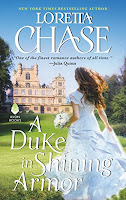
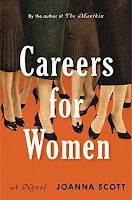
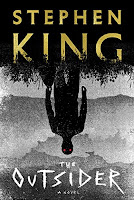
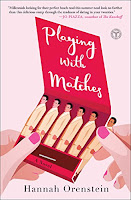
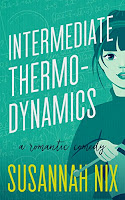
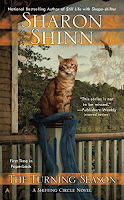
0 comments:
Post a Comment